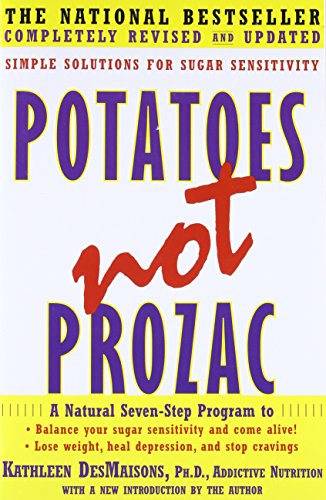Potatoes = weight loss superfood?
Options
Replies
-
Po-tay-toes! Boil em, mash em, stick em in a stew.
I think that any mono-diet causes people to lose weight because they get tired of eating the same thing.1 -
Fatty_Nuff wrote: »At least two fad diet books based on this premise. I'm sure the authors laughed all the way to the bank. If there was any food with magical weight loss properties, none of us would be here.
Is this one of them?
0 -
My most filling dinner for the least calories is chicken, broccoli, potatoes, and butter.0
-
Potatoes might be my #1 reason for never going low carb again.5
-
neugebauer52 wrote: »So if I DO NOT eat potatoes - would that mean, that "potentially" I might lose weight? Ridiculous! Were our ancestors told a million years ago? How did they survive with or without potatoes?
Unless your ancestors include indigenous natives of Peru, probably not. Still, the indigenous pre-Colombian natives of Peru built an empire on potatoes.2 -
JeromeBarry1 wrote: »neugebauer52 wrote: »So if I DO NOT eat potatoes - would that mean, that "potentially" I might lose weight? Ridiculous! Were our ancestors told a million years ago? How did they survive with or without potatoes?
Unless your ancestors include indigenous natives of Peru, probably not. Still, the indigenous pre-Colombian natives of Peru built an empire on potatoes.
Ah good old Sir Walter Raleigh, us Brits have had spuds since 1554 thanks to him 0
0 -
suziecue25 wrote: »JeromeBarry1 wrote: »neugebauer52 wrote: »So if I DO NOT eat potatoes - would that mean, that "potentially" I might lose weight? Ridiculous! Were our ancestors told a million years ago? How did they survive with or without potatoes?
Unless your ancestors include indigenous natives of Peru, probably not. Still, the indigenous pre-Colombian natives of Peru built an empire on potatoes.
Ah good old Sir Walter Raleigh, us Brits have had spuds since 1554 thanks to him
People thought they were poisonous for a while.
The French tried to promote them in the years before the French Revolution when there were recurrent grain failures. If it had worked better, maybe no French Revolution. (Let them eat potatoes!)
https://www.thevintagenews.com/2016/10/02/order-popularize-potatoes-france-parmentier-placed-armed-guards-potatoes-fields-instructed-guards-accept-bribes-let-people-steal-potatoes/
https://www.smithsonianmag.com/history/how-the-potato-changed-the-world-108470605/Unlike any previous European crop, potatoes are grown not from seed but from little chunks of tuber—the misnamed “seed potatoes.” Continental farmers regarded this alien food with fascinated suspicion; some believed it an aphrodisiac, others a cause of fever or leprosy. The philosopher-critic Denis Diderot took a middle stance in his Encyclopedia (1751-65), Europe’s first general compendium of Enlightenment thought. “No matter how you prepare it, the root is tasteless and starchy,” he wrote. “It cannot be regarded as an enjoyable food, but it provides abundant, reasonably healthy food for men who want nothing but sustenance.” Diderot viewed the potato as “windy.” (It caused gas.) Still, he gave it the thumbs up. “What is windiness,” he asked, “to the strong bodies of peasants and laborers?”
With such halfhearted endorsements, the potato spread slowly. When Prussia was hit by famine in 1744, King Frederick the Great, a potato enthusiast, had to order the peasantry to eat the tubers. In England, 18th-century farmers denounced S. tuberosum as an advance scout for hated Roman Catholicism. “No Potatoes, No Popery!” was an election slogan in 1765. France was especially slow to adopt the spud. Into the fray stepped Antoine-Augustin Parmentier, the potato’s Johnny Appleseed.
Trained as a pharmacist, Parmentier served in the army during the Seven Years’ War and was captured by the Prussians—five times. During his multiple prison stints he ate little but potatoes, a diet that kept him in good health. His surprise at this outcome led Parmentier to become a pioneering nutritional chemist after the war ended, in 1763; he devoted the rest of his life to promulgating S. tuberosum.
Parmentier’s timing was good. After Louis XVI was crowned in 1775, he lifted price controls on grain. Bread prices shot up, sparking what became known as the Flour War: more than 300 civil disturbances in 82 towns. Parmentier tirelessly proclaimed that France would stop fighting over bread if only her citizens would eat potatoes. Meanwhile, he set up one publicity stunt after another: presenting an all-potato dinner to high-society guests (the story goes that Thomas Jefferson, one of the guests, was so delighted he introduced French fries to America); supposedly persuading the king and queen to wear potato blossoms; and planting 40 acres of potatoes at the edge of Paris, knowing that famished commoners would steal them.2
Categories
- All Categories
- 1.4M Health, Wellness and Goals
- 391.3K Introduce Yourself
- 43.4K Getting Started
- 259.6K Health and Weight Loss
- 175.6K Food and Nutrition
- 47.3K Recipes
- 232.3K Fitness and Exercise
- 387 Sleep, Mindfulness and Overall Wellness
- 6.4K Goal: Maintaining Weight
- 8.5K Goal: Gaining Weight and Body Building
- 152.7K Motivation and Support
- 7.8K Challenges
- 1.3K Debate Club
- 96.2K Chit-Chat
- 2.5K Fun and Games
- 3.2K MyFitnessPal Information
- 22 News and Announcements
- 911 Feature Suggestions and Ideas
- 2.3K MyFitnessPal Tech Support Questions





